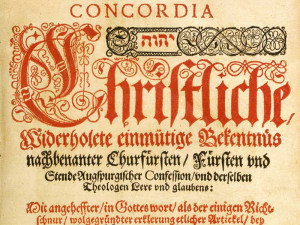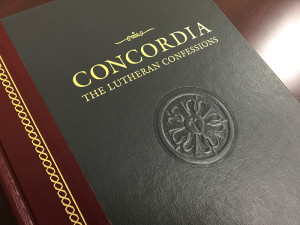by Rev. Mark C. Bestul
 One might think the question “Are good works necessary?” is a pretty straight forward question. But, without clearly defining the terms “good works” and “necessary”… well, that leaves just the “are” to be straight forward!
One might think the question “Are good works necessary?” is a pretty straight forward question. But, without clearly defining the terms “good works” and “necessary”… well, that leaves just the “are” to be straight forward!
The Lutherans of the Reformation era found that answering this question about good works wasn’t so straightforward, at least not when handled by us sinners and our own intentions and interpretations. During the 1550’s, with fear of Papistic works-righteousness on the one hand and Epicurean (“satisfy-the-desires-of-the-flesh”) freedom-loving on the other, Lutherans struggled to ensure that the Biblical teaching of good works was properly articulated. On the one hand, “justification by grace alone through faith alone” needed to be defended; on the other hand, as Luther famously said, “faith alone saves, but faith is never alone.”
As we’ll study more below, the Confessors of the Formula of Concord took great care to properly define “good work” as that which flows, not unto faith and salvation, but from faith and salvation; moreover, they defined “necessary” not as that which was required to please God, but that which naturally and freely flows from the New Adam’s trust in (and desire to please) God.
Today, the need to carefully articulate the Biblical teaching of good works remains because some interpret any reference of “good works” as aiding unto salvation. The proper understanding of the term “necessary” is key: Are “good works necessary” because the burdened conscience is coerced by the law to please an angry God, or because the clear conscience of faith “is bound to bring forth good works” (AC VI)?
Therefore, we benefit from studying in detail and appreciating how the Formula of Concord addressed the confusion surrounding “good works” as an article of the Christian faith. Article IV of the Formula of Concord’s Epitome (Concordia: The Lutheran Confessions, 2nd ed., p. 546ff) can be summarized this way:
 -Status of the Controversy: Good works being defined as “for” / “against” salvation. How does one define the term “necessary”?
-Status of the Controversy: Good works being defined as “for” / “against” salvation. How does one define the term “necessary”?
-Affirmative Statements: We believe in good works following from faith naturally and freely (according to the New Adam), though also imperfectly (as we are simultaneously saint and sinner); but such good works do not lead to, contribute to, or maintain faith and salvation (which is the work of the Spirit).
-Negative Statements: We reject the opposing notions that good works contribute to salvation or are harmful to salvation, as well as the antinomian teachings that willful sin (the opposite of ‘good works’) won’t endanger faith.
With that basic outline in mind, let’s consider the Solid Declaration (Concordia: The Lutheran Confessions, 2nd ed., p. 546ff):
1. The first five paragraphs highlight how important careful use of terminology is in the Church, even stating boldly, “The expressions mentioned above are not to be tolerated in the Church” (para. 2). Later, paragraph 36 reiterates that “according to St. Paul’s admonition (2 Timothy 1:13) it is safe to hold fast both to ‘the pattern of sound words’ and to the pure doctrine itself. In this way, much unnecessary wrangling may be cut off and the Church preserved from many scandals.” How does this mindset give us pause about ‘repackaging the Gospel’ today and an appreciation for and desire to safeguard the pattern of words handed down to us?
2. While we most often focus on the term “necessary” as a problem in this discussion, paragraph 7 hints that the term “good work”, though not misunderstood within Lutheranism, is misunderstood by other teachings. How does paragraph 7 define good works, distancing them from human intentions and traditions, and locating them in the will of God, flowing from faith, and part of life in the new creation?
 3. Read and meditate upon paragraphs 10-12 and Luther’s description of faith and its relationship to good works. What a wonderful understanding to cherish and learn from!
3. Read and meditate upon paragraphs 10-12 and Luther’s description of faith and its relationship to good works. What a wonderful understanding to cherish and learn from!
4. According to paragraphs 14-20, what is the difference between an understanding of good works that are “forced”, “coerced”, or “wrung from a person against his will” and the understanding that good works are necessarily (naturally) flowing from “the people of the New Testament”? How does this help us understand the words of the Offertory, “renew a right spirit within me… Restore unto me the joy of Thy salvation, and uphold me with Thy free spirit” (underline added)?
5. Paragraph 22 is a must!: “We must be on our guard well to make sure that works are not brought into the article of justification and salvation.” How does this help us understand that, whenever we speak of ‘good works’, we already assume the context of the baptismal life?
6. Just as much as the claim that “good works are necessary for salvation” must be rejected, so must be rejected any delusion that good works ought not be exhorted in the preservation of the faith. Read paragraphs 30-33: how does this frame our understanding of what ought be included in sermons and the pastor’s teaching of God’s people?
7. “On the other hand” (para. 34), how must pastors be careful in their preaching, and people careful in their hearing, not to understand such exhortation to mean that a person’s certainty of salvation lies with his perseverance of good works?
8. Consider the Scriptural image – “A good tree bears good fruit” (see Matt. 7:18). Likewise, read the words of Paul Speratus’ hymn, “Salvation Unto Us Has Come” (LSB #555, especially verse 9). How does FC IV on “Good Works” echo and confess this Biblical truth?
9. Consider the importance of understanding this distinction: “Are good works detrimental to salvation?” Yes, if one places his hopes in the merit of his efforts rather than in the merit of Christ and the promise of God’s Word. On the other hand, No, if good works are done in faith, they serve as evidence of salvation and a confession of faith in Christ; and God will reward them gloriously in this life and the life of the world to come.
 To close our study on this article, we cherish these words of para. 39-40: “A person should avoid what is harmful to his salvation with the greatest diligence. Christians should not be frightened away from good works, but should be admonished and urged to do them most diligently.” God grant us this in our preaching, hearing, learning, and daily living!
To close our study on this article, we cherish these words of para. 39-40: “A person should avoid what is harmful to his salvation with the greatest diligence. Christians should not be frightened away from good works, but should be admonished and urged to do them most diligently.” God grant us this in our preaching, hearing, learning, and daily living!
The Rev. Mark C. Bestul is pastor of Calvary Lutheran Church in Elgin, Ill.
